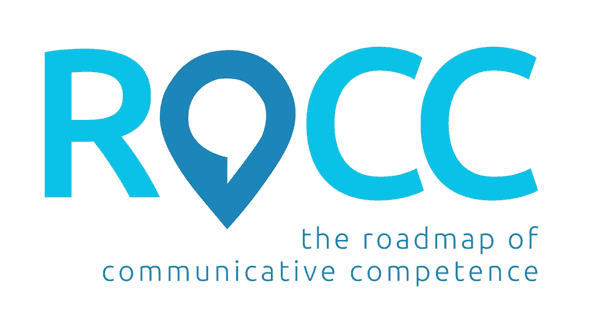We recently had the chance to hear from one of our school subscribers in depth about how they implemented the ROCC at their school – including the challenges faced, benefits they’ve gained, and results achieved! There was so much to learn from talking to them, so we couldn’t keep the feedback to ourselves.
Below are the questions we asked, and the responses given to us by representatives from St Paul’s College in Victoria.

Q – How did you roll out the ROCC at your school?
We first rolled out the ROCC in 2020 which included all teachers being trained in how to administer and score. Following this training teachers were required to complete the ROCC for each of their students and if they had any questions or concerns they could seek support from the speech pathology team. Teachers were required to have their ROCC assessments completed before Week 1 of Term 1 however strongly encouraged to complete them before the end of Term 4. During the summer holidays the speech pathologists cross checked the data and approved it, then selected the goals/domains to focus on for the year (2021).
This same process occurred at the end of 2021/start of 2022.
PD was provided to all staff so that everyone was aware of the data, what the goals were and why. Speech Pathologists also provided resources and classroom coaching to support the implementation of goals.
ROCC comment: It’s so great to see collaboration between the educators and the speech pathologists.
Q – What were some of the challenges?
It was challenging for teachers to find the time to complete the ROCC assessment as it can be time consuming for classes with 5+ students as each ROCC assessment takes on average 20-30 minutes to complete.
When new staff join our school, they are not trained in the ROCC assessment either, which then requires extensive support from the speech pathologists in order to complete these.
ROCC comment: Hopefully as teachers become more aware of their students and familiar with the ROCC, this scoring time should reduce. On the flip side, 20-30 minutes is also time well spent to better understand the student’s communication so that your lesson planning, resource creation and teaching are targeted and efficient to best support their needs.
Q – What were some of the benefits?
There were several benefits:
- Teachers felt as though they’re students’ communication was being assessed
- The assessment covers several aspects of AAC in the specialist school setting which not many assessments we’ve come across cover
- We can track change and progress at individual, class and whole school levels
- The results guide what our main goals and focuses of each year will be
ROCC comment: R stands for Roadmap, so it’s great to see ROCC being used to guide goals.
Q – If you did it again, what would you change?
If we were to roll out the ROCC again we would most likely keep the same process as above however it would’ve been nice to have a plan/induction process for new staff as 2-3 years post initial training there are several teachers who are not ROCC trained.
ROCC comment: The online training can be helpful for this, or interview style scoring where a more knowledgeable staff member can talk through the scoring with a new staff member to support their learning.
Q – Does the data show change in the areas you’ve been focusing on?
At the end of 2020 every student was assessed again, this data guided the goals/areas of focus for 2021. The main areas highlighted in that set of data was:
- Use of symbolic language (domain 1) as just over 40% of students communicated only with facial expressions, body language or vocal sounds
- Accessibility (domain 8) as approximately 60% of students were not responsible for carrying their communication system – others were responsible
At the end of 2021 all students were reassessed and found that there was over a 10% improvement in Domain 1 as 60% of students were either using gestures, forms of AAC and/or verbal language to communicate. We also found that 55% of students were either beginning or were taking responsibility for the communication devices, an increase of 15% over a 12-month period in regard to Domain 8.
ROCC comment: What a great outcome and validation of the hard work you are all doing. This was the original purpose behind the creation of the ROCC Assessment so it’s lovely to see your results.
Q – What strategies did you use to focus on those areas as a whole school, and do you feel they were successful?
In Term 1 of 2021 we presented the ROCC data to the teachers and highlighted the areas we will be working on for the year.
Use of Specific Language (Domain 1) – We introduced and provided education on Core vs. Fringe vocabulary. We encouraged our teachers to model core vocabulary throughout the day as well as frequently visited classes and modelled how to use core vocabulary throughout different activities. We even trialled incorporating core words into literacy by having specific core words to focus on for each story. Our goal was to train teachers on how to use core vocabulary throughout the day throughout different activities.
Examples of how we embedded core vocabulary into literacy is shown below (images provided by St Paul’s College):
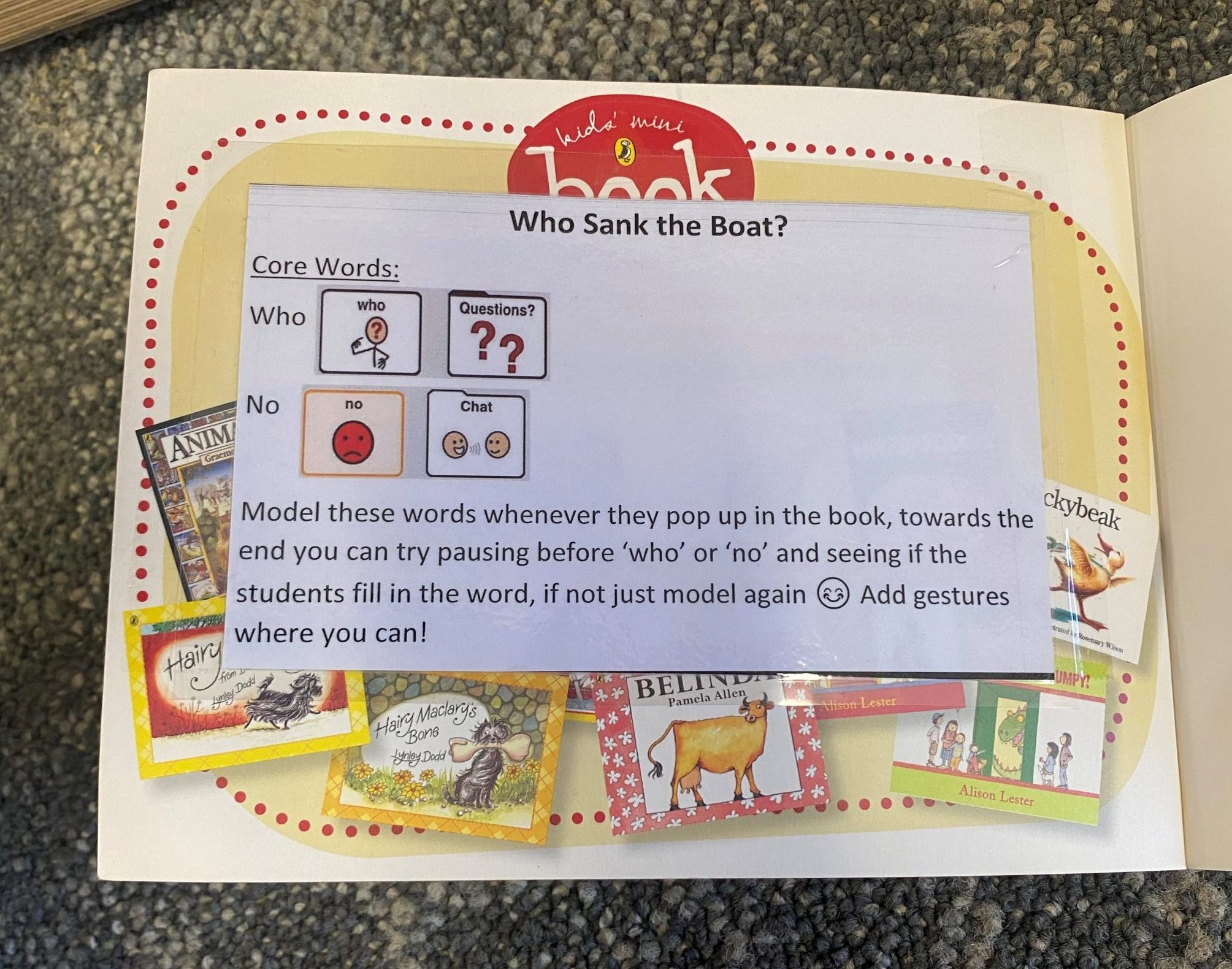

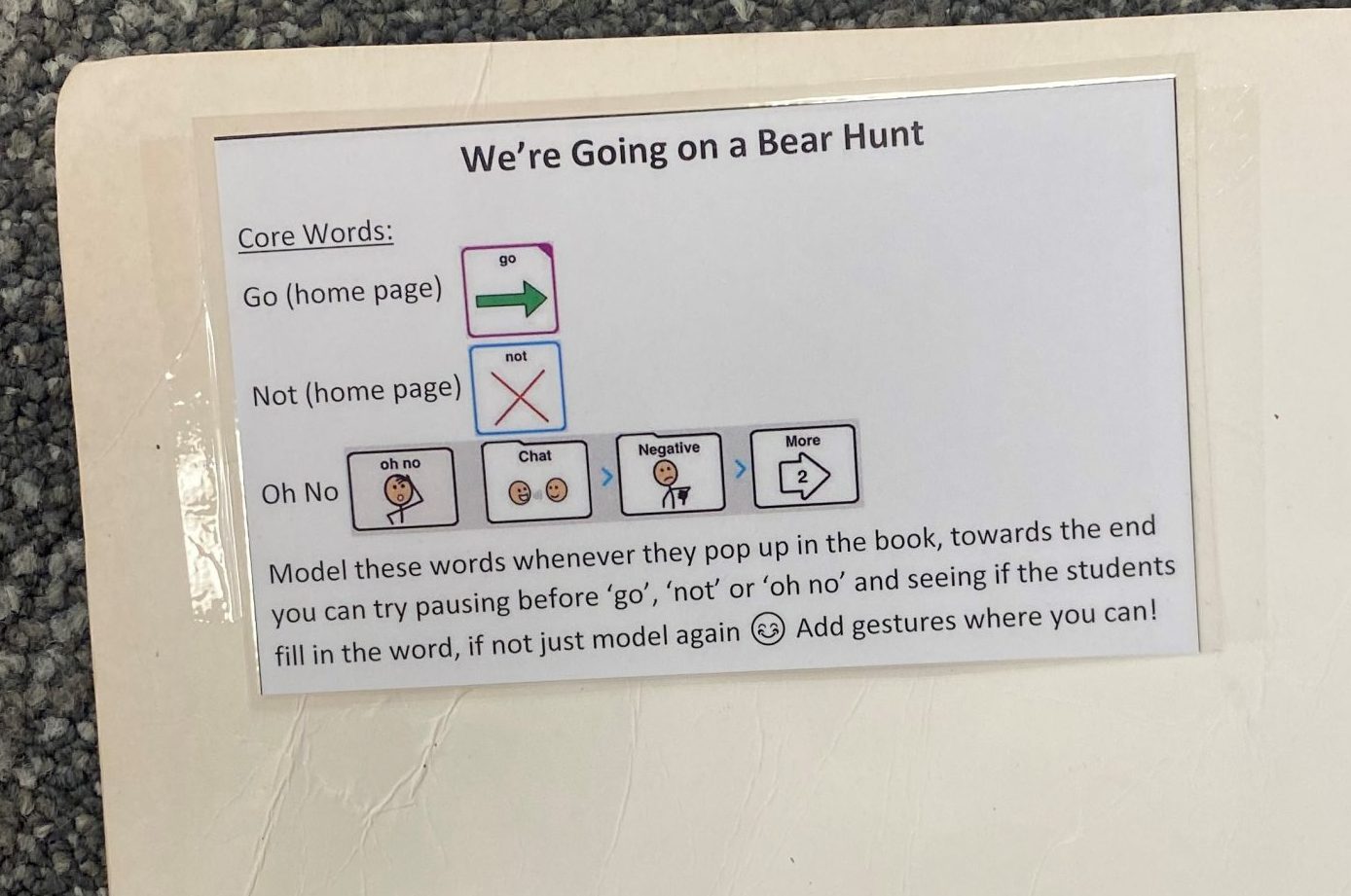
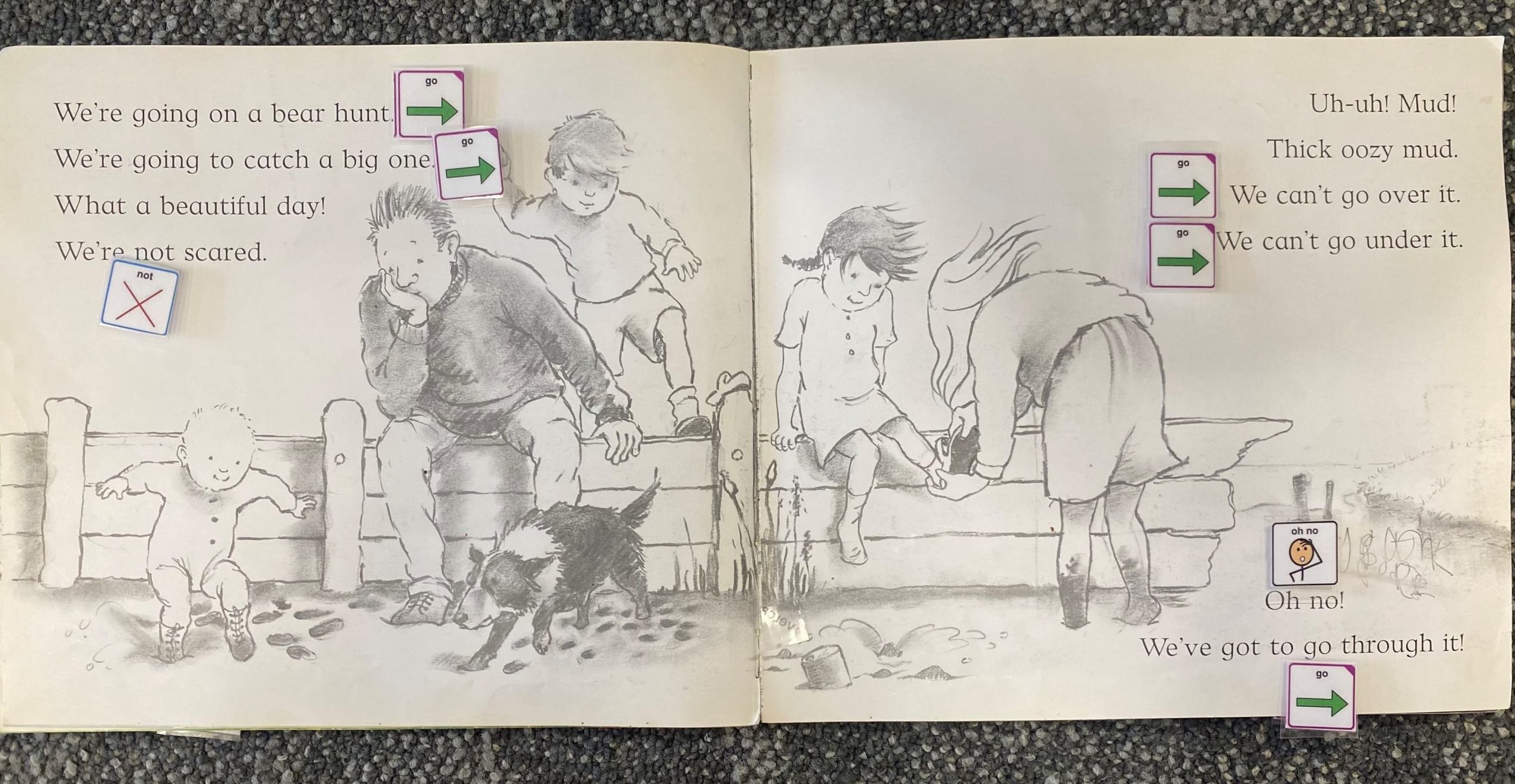
Accessibility (Domain 8) – We put visual reminders in every classroom and around the school to remind students and staff to take communication devices with them.
Examples (images provided by St Paul’s College):
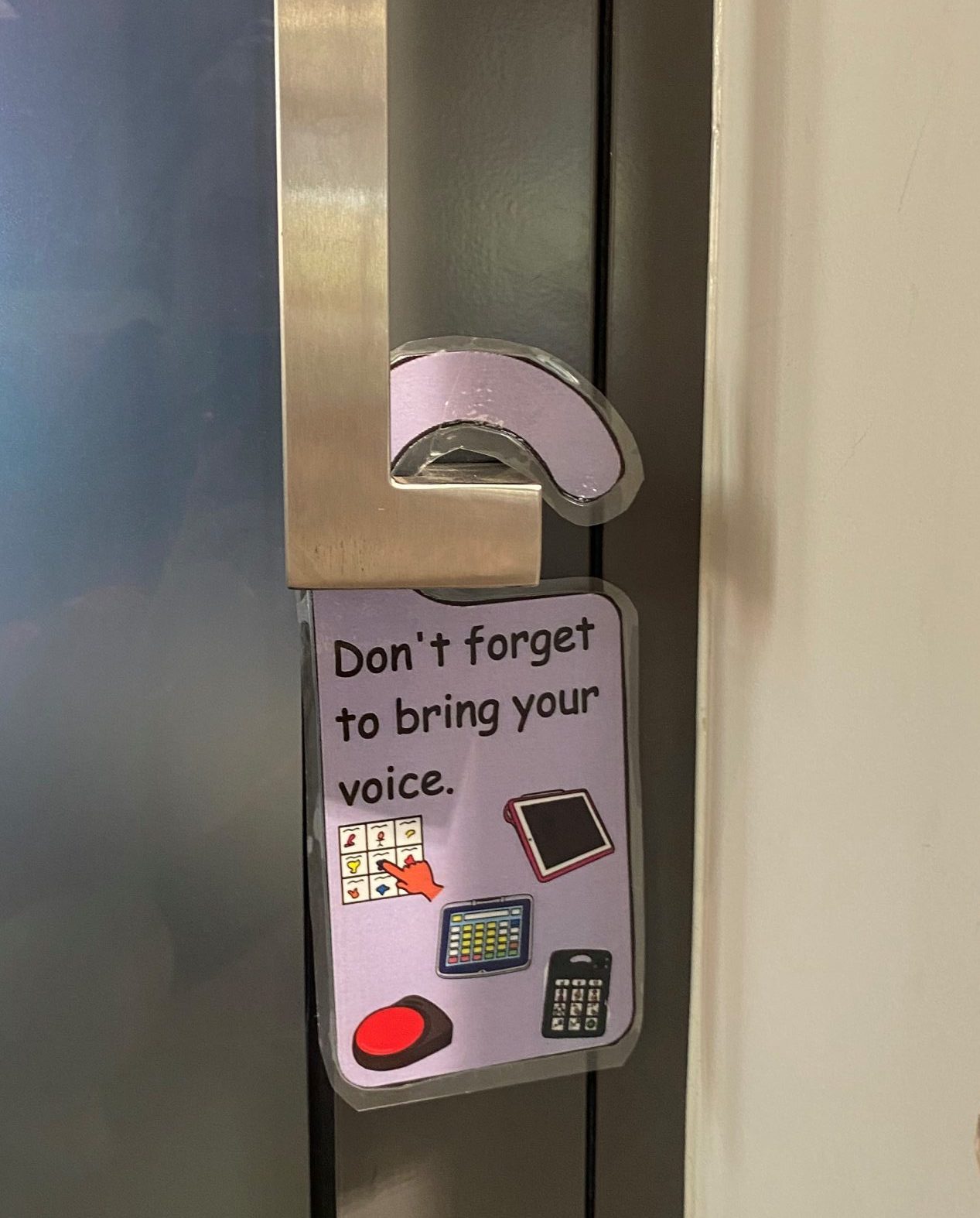
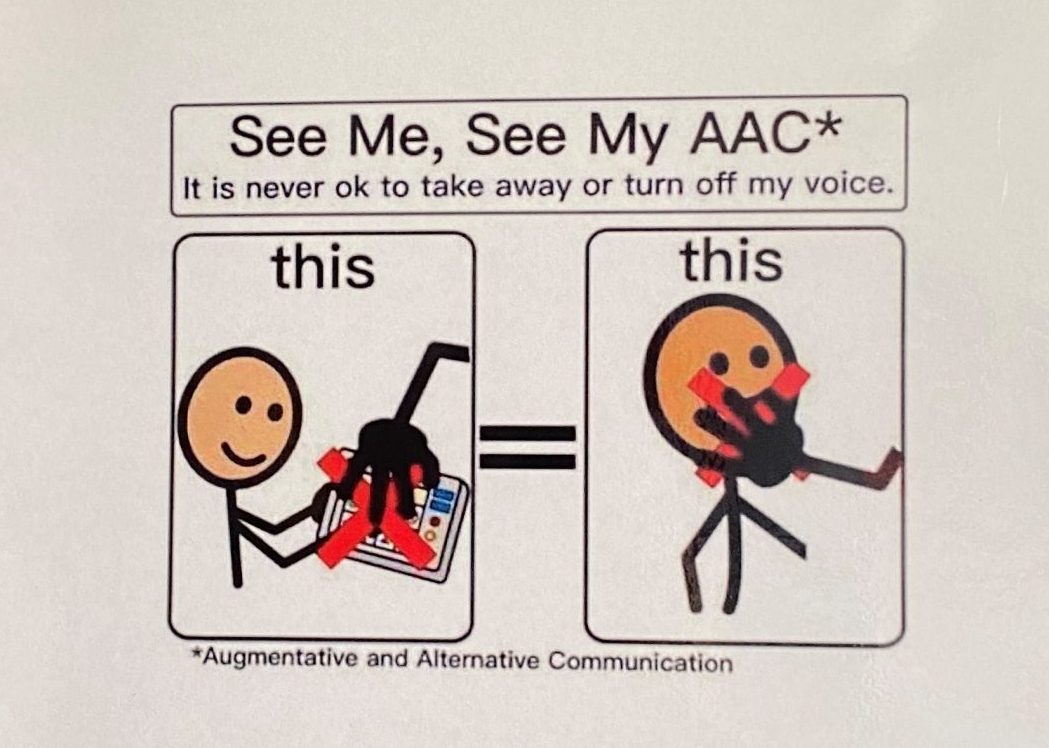
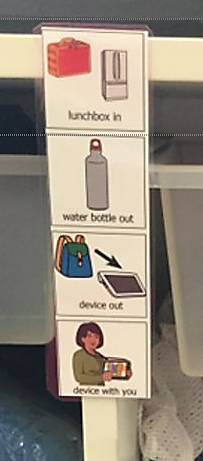
We taught teachers ‘catch phrases’ to use to prompt students to remember the devices such as ‘remember to take your voice’ or ‘you forgot your voice’. We focussed on accessibility within each classroom, promoting the student to take the device with them around the room.
In addition to students having their own personal communication devices, each class also has their own Dedicated Communication iPad installed with Proloquo2Go (some iPads had other apps such as TouchChat and LAMP to cater for the communication needs of their students). We gave teachers a list of expectations for them to follow in relation to the classroom iPads which included them always being:
- Charged and turned on
- Worn by staff on their body or ensured it was within arm’s reach
- Locked with Guided Access
- Owned by staff, shouldn’t be assigned to a particular student
We also encouraged parents to get straps or cases with a handle for the child’s personal communication devices to promote ease of transport between locations (e.g. classroom to art room).
ROCC comment: Such great ideas and thanks for sharing these with us.
Q – How did the data help you to plan as well as reflect?
The data was fantastic in helping us plan as it assisted us in identifying what areas to focus on for the year. This data also allows us to collect long-term data to reflect and determine if what we have been working on is actually working (which it has always been found to).
ROCC comment: It’s great to see this ‘Plan – Do – Check – Act’ cycle working well for you.
Q – How has ROCC been used to support individual as well as whole school goal setting?
The ROCC helps us look at a child across all 10 domains and track change over time. If we identify an area of concern (e.g. plateau, decrease) we can bring this up with their teacher and brainstorm ways to support that child regarding the specific areas/domains of concern. On the flip side, we can also track the progress of each individual student which is great to have access to.
In terms of whole school goal setting, as explained above, the ROCC has been a very valuable tool in terms of helping us identify areas to focus on for the year as well as track change and progress.
Q – Do you feel that focussing on one area has had impact on any others?
Definitely. Last year (2021) our main goals were Use of Symbolic Language and Accessibility however when we reassessed our students at the end of 2021 there were positive gains across 7 other domains.
ROCC comment: Hooray – “collateral improvement”. We can see a lot less red and orange in the 2021 graph below compared to 2020.
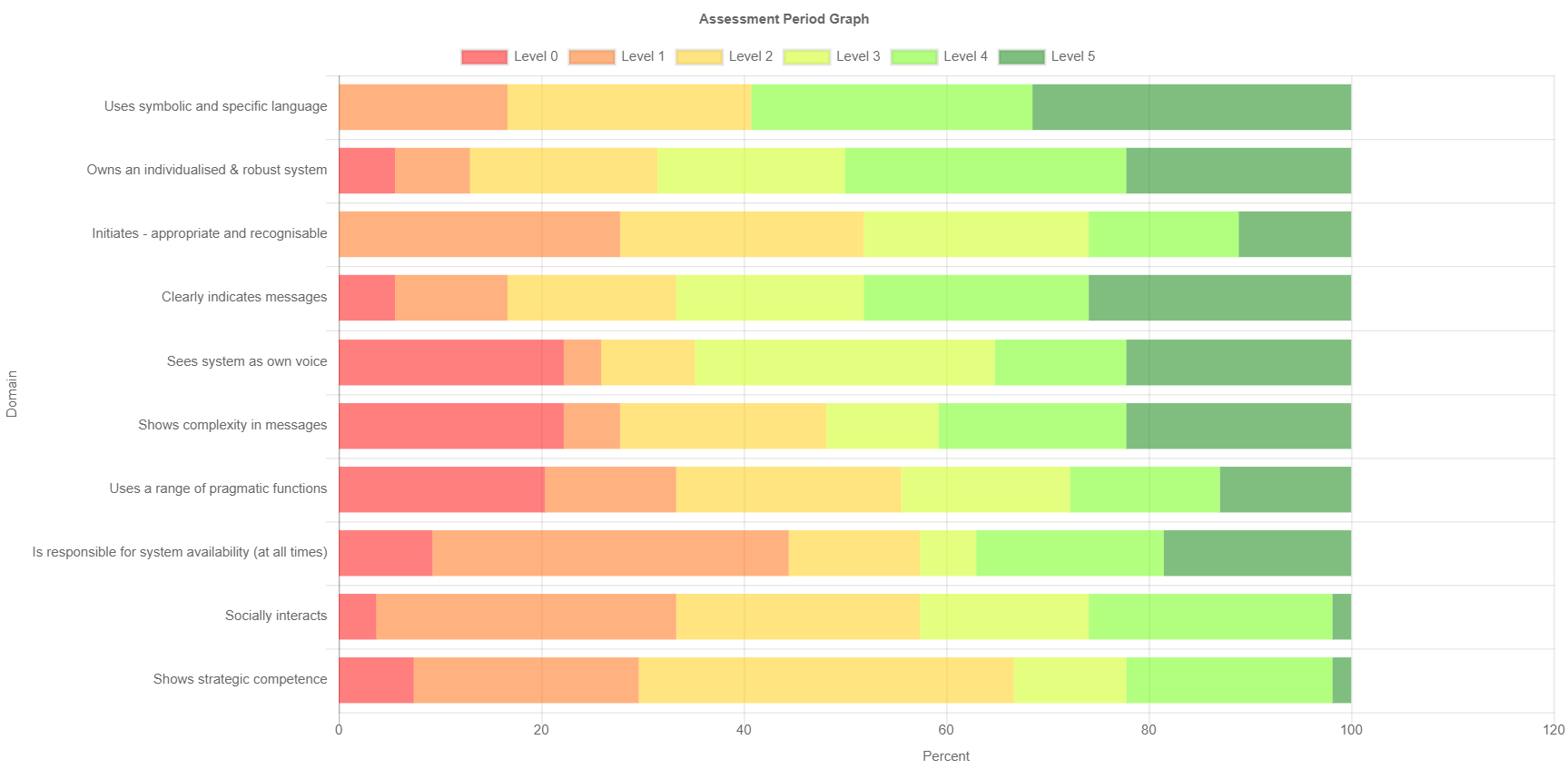
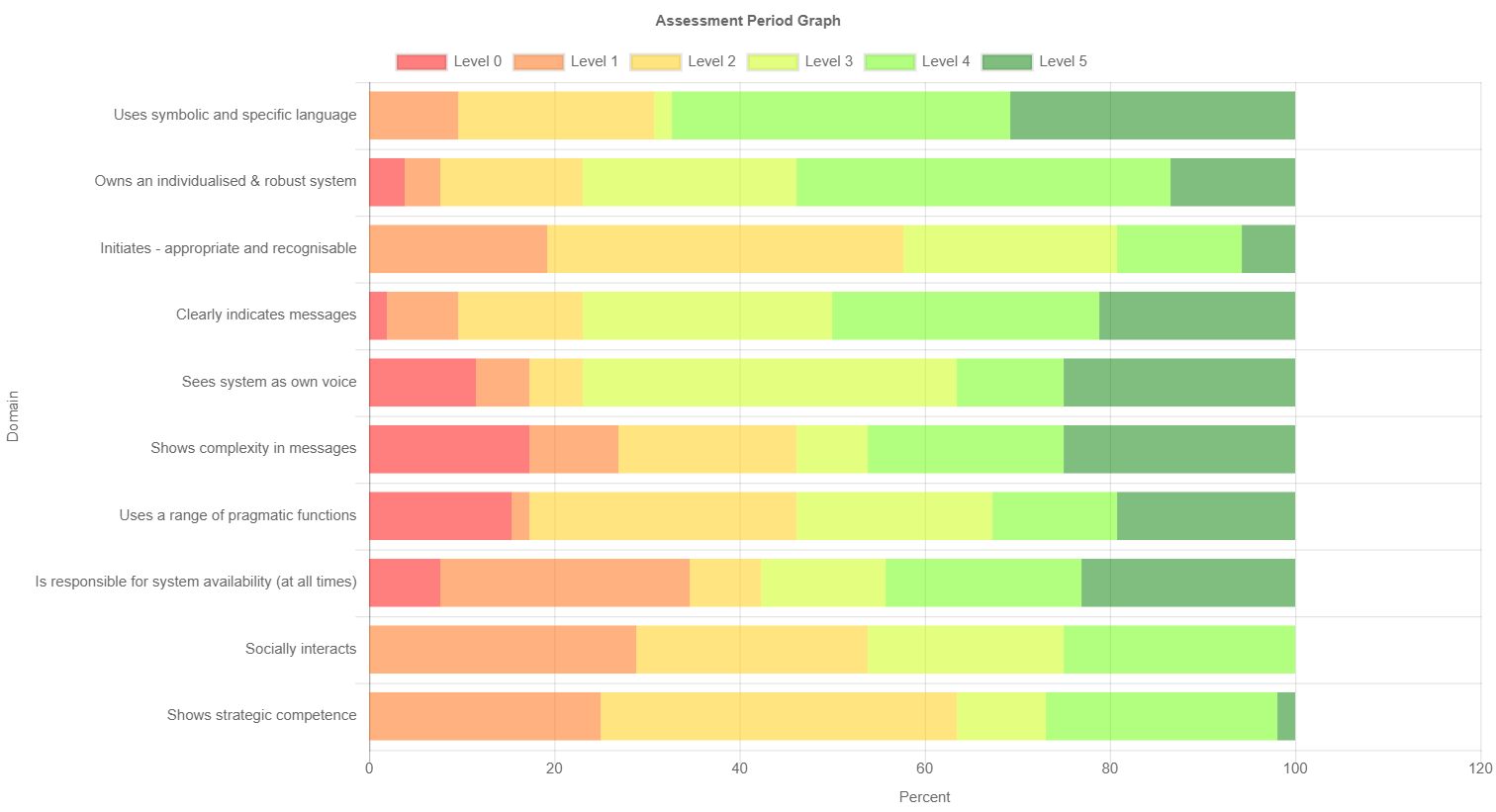
Q – What are your new whole school goals for this year based on the progress you have made?
Our new school goal for this year which we have identified are Goal 3 Initiation and Goal 7 Pragmatics if our timeline allows.
Q – What are some of the strategies you’ve thought about to address them?
Some of the strategies we have thought to address Goal 3 are:
- Video modelling
- Acknowledging appropriate initiation attempt, verbally referencing initiations
- Exaggerated modelling of different methods of initiation
- Social story
- Re-introducing wristbands
We would also provide professional development around what initiation is, the difference between initiating and responding, interaction styles (using the strategy from the Hanen program, e.g. OWL (Observe, Wait and Listen), etc).
ROCC comment: In summary…
We hope you’ve gained some useful insights from this school’s observations! We certainly have.
If you’d like to contribute a case study to be a ROCC Star School, please send us an email, or use this template to provide us with more information.
If you have any questions about the ROCC or would like to find out more, take a look at our dedicated FAQs page on our website: https://www.roccassessment.com.au/frequently-asked-questions-about-rocc/ or feel free to contact us anytime at rocc@roccassessment.com.au or via phone at 0407 603 671.
